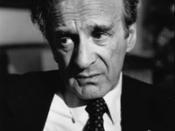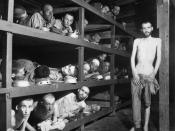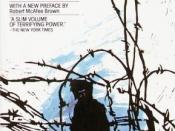There is no story that can be read, written, or told that would be as horrifying as that of the six million Jews who were exterminated during World War II by Nazi German soldiers under the command of Adolph Hitler. This period of time is known as the Holocaust. Night is the vivid account of a man who lived to tell of the murder, starvation, physical abuse, animal-like treatment, and complete mental breakdown that the Jews endured throughout the Holocaust. This man, Elie Wiesel, was fifteen years old when he survived this horrible experience, and years later he gathered the courage to tell his story to the world, in hopes that others would come to understand just how dark and depressing the Holocaust caused his life and the lives of millions of other Jews to become. During his recollection Elie frequently makes reference to his title, Night, in order to instill an unforgettable message into the readers mind.
Elie wants the reader to realize that nighttime is the only time in which one can have nightmares, and a nightmare is just what the Holocaust was. In fact, the Holocaust became a never-ending nightmare that continues to haunt Elie's mind even today. Ten years after the Holocaust ended Elie is still struggling to comprehend his experiences. This forces the reader to realize the horrific memories implanted into the mind of a Holocaust survivor become indelible. The horror of the Holocaust becomes a reality to the reader when Elie describes Jews eating snow off each other's backs, when he laments of the long march from Buna to Buchenwald, and, above all, when in the last paragraph of the book he looks at himself in a mirror and sees a stranger staring back at him.
One snowy night the Jews were at Buna and suffering from extreme thirst. Someone had the idea to eat the snow to relieve his or her thirst. The cruelty of the Nazis was exemplified by their laughter at the Jews' pathetic attempt to stay hydrated. At this point in the book the Jews were being starved, beaten for no reason, murdered, and burned in crematories by the Nazis. As the Jews eat the snow off each other's backs (they would have eaten it off the ground had they been able to bend over without being shot dead by a Nazi) they look at the faces of their abusers and all they see are smiles, all they hear is laughter. To the Nazis this whole experience was simply a game, and for the Jews it was hell. The Jews would have preferred death than to live as animals at the hands of the Nazis. However, it is the inhumane Nazis who were the animals. Yet they controlled the fate of each Jew, and that was a contributing factor to the nightmare that each Jew lived day in and day out.
Not long after the snow-eating incident Elie survived a forty-two mile march (or sprint) through the falling snow, and in the darkness of night. Although he completed this heroic journey, he did not feel as though he had accomplished anything. Surviving this trip was an amazing feat in itself, and Elie was one of few Jews who had the indomitable strength to live through it, while enduring incredible painful experiences. In any other nightmare the end of Elie's trek would be the time that one would wake up in a cold sweat, but in the Holocaust the end of Elie's trek was the time when Elie would be starved for the following three days, survive another selection, and eventually have to watch his own father die. This is point in the book that the reader loses all confidence that any good will ever come to Elie. I believe this is just how Elie Wiesel wants this book to make you feel. He wants the reader to know that after each hardship he overcame, another was instantly presented to him. There was no time for him to think, and no time for him to rest. This was a nightmare that seemed to have no end.
When the Americans conquered the Germans and freed the Jews from the concentration camps the reader is hopeful that Elie's suffering may have finally come to an end. Unfortunately, it soon becomes clear that his pain is long from being gone. Shortly after being released from the concentration camps Elie is admitted into a hospital due to food poisoning. One day, while still recuperating from his illness, Elie gets up from his hospital bed to view himself in the mirror. What he sees in his reflection is not the face he once knew, but rather a stranger, someone he had never seen before, who looked sick, old, and tired. The toll that the Holocaust had taken on not only Elie's mental state, but also his physical state is clearly depicted. He cannot even recognize his own self. While looking in he mirror he believes he is looking at another man. How could this have happened? Elie's suffering was supposed to have ended with the war, right? No, it is when Elie looks into the mirror that the reader can finally understand that Elie's suffering will never end, that this is one story that will have no happy ending, and that the Holocaust had put a dark cloud over Elie's life forever.
Elie Wiesel lived to tell of the Nazis, and the most shameful time in human history. The Nazis are an example of all that can be cowardly and wrong with a human being. On the other hand, Elie Wiesel represents the best in all of us. As he tells the story of his own survival, he provides a standard of courage under extreme duress that we all can aspire to.





